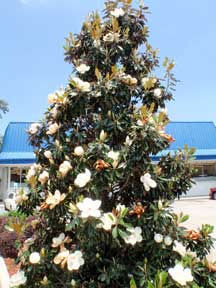So I was taking a walk, picked a blossom from my favorite magnolia tree and set it in a vase next to my computer. The fragrance was intoxicating, and I got to thinking… hmmm… we use all sorts of plants for healing – echinacea for colds, dandelion for detox – CBD from hemp for cancer and more – maybe this magnolia, with it’s thick leathery leaves and intensely sweet fragrance, has medicinal benefits? Off on an early morning tangent, I found out that my hunch was true!
Turns out Magnolia Bark (Magnolia officinalis) is a Traditional Chinese Medicine (TCM) and has been used to treat menstrual cramps, abdominal pain, abdominal bloating and gas, nausea, loss of appetite, diarrhea, indigestion, coughs with phlegm, asthma and much more!
And, get this – Japanese researchers have determined that “honokiol” and “magnolol”, two chemicals found in Magnolia Bark, are up to 1000 times more potent than Vitamin E in antioxidant activity. These two active compounds are thought to contribute to the primary anti-stress and cortisol-balancing effects of the plant. Here is more of what I found:
TCM Properties: Anti-allergic, anti-asthmatic, anti-bacterial, anti-fungal, anti-septic, anti-spasmodic, anti-stress, anxiolytic (anti-anxiety), aphrodisiac, appetite stimulant, digestive, diuretic, emmenagogue (promotes menstruation), expectorant, ophthalmic, stomachic (tones stomach function), tonic and warming.
Anti-Cancer Benefits? Researchers at Jeonju University in Korea tested magnolia bark extract against human prostate cancer cells. The extract, magnolol, was taken from the bark from the root and stem of the magnolia tree. The results, published in the 2010 issue of Bioscience, Biotechnology and Biochemistry, show that magnolol stopped the development, invasion, growth and spread of prostate cancer cells. Other cancers that magnolia bark extracts have shown effectiveness in treating are leukemia and colorectal cancer, according to a report from Chinese Medicine News.
Weight loss? Magnolia Bark is getting much press as a “cortisol”, the stress hormone-lowering supplement. Cortisol has also been associated with weight gain (particularly fat in the abdominal area), sugar control problems, memory problems, and a host of other stress induced disorders.
Anxiety? Honokiol was found to be five times stronger than Diazepam (Valium) in reducing anxiety without the side effects of diazepam. While Diazepam does reduce anxiety, it also induces muscle relaxation, an effect not shared by honokiol.
Depression? Magnolol and honokiol each provide health benefits on their own, but together they have a synergistic effect, according to researchers at Nanjing University in China. The study, published in the Nov. 28 issue of Progress in Neuro-psychopharmacology and Biological Psychiatry, shows that the extracts from magnolia bark have antidepressant properties.
Alzheimer’s Disease? Magnolia has several powerful effects on acetylcholine levels in the brain, offering potential benefits for victims of Alzheimer’s Disease. Alzheimer’s Disease is characterized by insufficient levels of acetylcholine, accompanied by the buildup of amyloid plaque in the brain, disrupting normal brain functioning.
Inflammation & Asthma? Magnolol was found in studies to support the body’s natural production of adrenal steroids (corticosteroids) which suppress inflammation. This anti-inflammatory effect is thought responsible for alleviating the allergic inflammatory response in cases of asthma.
Liver Protective Benefits? Excessive alcohol consumption can damage the liver, and lead to ALD, or Alcoholic Liver Disease, which involves the accumulation of fat around the liver which eventually damages the organ and impedes its function. When researchers at the Seoul National University in Korea tested the magnolia bark extracts, honokiol and magnolol, against ALD, the results were impressive. In the study, published in the April 2009 issue of the Journal of Pharmacological Sciences, the researchers fed rats alcohol until they developed ALD. Then, along with the alcohol diet, they administered magnolia extract, which completely reversed all of the previously induced fatty liver changes, leading researchers to conclude that magnolia extract may be a promising treatment for ALD.
As always, I encourage you to do further research. This link is about wide-reaching benefits: Honokiol Research Review in the Natural Medicine Journal. And this link is regarding Cancer Prevention and Therapy in the National Institute of Health library.
I drilled down and found an organic magnolia bark supplier in bulk and I will do some experimenting with tea and making capsules after I test for radiation with my geiger counter. Stay tuned and let me know if you try it!

